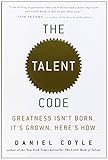Shows many examples of how deliberate practice on the edge of your current ability is what equals mastery ( whilst also exploring the science behind it )
Here the author only mentions about the importance of repetition (which she refers to as fluency). In the Talent code book Repetition is the first step, but we can learn that the brain is wired to master new skills by taking advantage of 2 others areas as well: A/ Ignition (or passion and motivation), and B/ Discipline and long term commitment.
[1] http://www.amazon.com/The-Talent-Code-Greatness-Grown/dp/055...
http://www.amazon.com/Talent-Code-Greatness-Born-Grown/dp/05...
Success/fame/fortune/happiness/etc are another matter, but skill acquisition has been shown to be generally straightforward. Some things may have higher learning curves for some people (e.g. math for a person with dyscalculia[1]), but that doesn't mean it's impossible.
However, since it is useful, here are some resources to begin learning about what intelligence and cognitive research have to say about the matter:
http://www.amazon.com/The-Talent-Code-Greatness-Grown/dp/055...
http://www.amazon.com/The-Genius-All-Us-Insights/dp/03073873...
http://healthland.time.com/2012/12/26/motivation-not-iq-matt...
http://www.cogmed.com/impact-working-memory-training-young-p...
http://www.cogmed.com/working-memory-but-not-iq-predicts-sub...
http://www.cogmed.com/working-memory-training-generalize-imp...
http://www.owlnet.rice.edu/~antonvillado/courses/09a_psyc630...
http://reports-archive.adm.cs.cmu.edu/anon/ml2009/CMU-ML-09-...
http://jabba.edb.utexas.edu/it/enhancingCognitiveSkill.pdf
There are plenty more resources out there, and I'm sure there are much better ones too. But the implication of all this is that learning is a skill, and that you can learn how to learn better. We may not yet thoroughly understand how generalized learning takes place in the brain, but it does seem to be a function of working memory and motivation, which can be improved. Generalized learning is segmented more finely than how I described it originally, but it still functions the same way (e.g. learning to juggle may not help you learn a new language better, but learning to play a musical instrument may help you to learn the other two more easily, since it incorporates language skills through music, and motor skills through playing). Making an argument against this model would place the burden of proof on that side, because as I mentioned before, there is no known mechanism that would lead to the outcome outlined by the 'fair'/balanced model, and it would have to explain away phenomena like neuroplasticity that seem to directly oppose it.
http://www.amazon.com/Talent-Code-Greatness-born-ebook/dp/B0...
It has interesting framework, divided into two. The first part is what you can do. The second is how you can create an environment that keeps you on track.
Scales and chords aren't patterns per se -- they're the fundamental building blocks. They're the equivalent of syntax in a language. Not knowing them well is like having to think about where the semicolons and/or braces go when you're writing a for loop. Being familiar with chords/scales allows you to think about music at a higher abstraction level.
You can make exercises less boring (and more effective) by varying the way you play them. Vary the rhythm you play (triplets, etc), switch between legato/staccato, and so on.
The Deep Practice section of The Talent Code (http://www.amazon.com/Talent-Code-Greatness-Born-Grown/dp/05...) may provide more inspiration for how to practice effectively.
http://www.amazon.com/Talent-Code-Greatness-Born-Grown/dp/05...
The book suggests that great talent -- specifically "success" in the athletic / superstar world -- also has environmental factors. There are environment cues that activate subconscious fears. For example, training facilities that train world-class athletes tend to be in the dumps, sending the subconscious cue, "You have to get out of here". Another environmental cue is seeing graduated successes. For example, a soccer talent hub has little kids running around playing soccer, older kids playing pick-up games, amateurs who are trying to make it into the pros, and pros who are both friends and rivals.
In regards to financial success, one environmental fear might be having a deep-seated financial insecurity. For example, Tony Robbins was a successful NLP trainer since he was in his early 20s; he made it big briefly than splurge all of his paper wealth. He didn't actually acquire lasting assets until his first child was born. However, it could be argued that since he grew up poor, seeing his newborn child tied into that insecurity he grew up with.
I have a book recommended by Tim Ferris called "Leap" (Rick Smith, http://www.amazon.com/Leap-Simple-Changes-Propel-Career/dp/1...). I have not yet finished the book. However, Ferris's review (http://www.fourhourworkweek.com/blog/2009/09/13/bill-gates-r...) was essentially about how some of the biggest successes actually hedged their risks.
I've been setting up a new business right now in real estate. It is very different from what I was used to -- technologies. It is much more people-intensive, and most of the people I am dealing with don't really do emails. (That is changing, but not yet). The fears I usually come up against are the same kind of fears I have the first time I signed LLC paperwork about five years ago. That time, I was physically shaking when I spent three days putting together the operating agreement. The next two business entities I formed were as boring as "going down to the post office and opening up a PO box". My point is, if I try motivating myself with a craving for attention, that's too much of a struggle. That creates paralysis in me. Your mileage may vary.
The hack I'm trying now uses a definition of "courage" that wipes away fear going forward.

